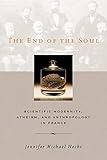The End of the Soul : Scientific Modernity, Atheism, and Anthropology in France / Jennifer Hecht.
Material type: TextPublisher: New York, NY : Columbia University Press, [2005]Copyright date: ©2005Description: 1 online resource (416 p.)Content type:
TextPublisher: New York, NY : Columbia University Press, [2005]Copyright date: ©2005Description: 1 online resource (416 p.)Content type: - 9780231128476
- 9780231502382
- 211.8094409034
- BL2765.F8 .H43 2012
- online - DeGruyter
- Issued also in print.
| Item type | Current library | Call number | URL | Status | Notes | Barcode | |
|---|---|---|---|---|---|---|---|
 eBook
eBook
|
Biblioteca "Angelicum" Pont. Univ. S.Tommaso d'Aquino Nuvola online | online - DeGruyter (Browse shelf(Opens below)) | Online access | Not for loan (Accesso limitato) | Accesso per gli utenti autorizzati / Access for authorized users | (dgr)9780231502382 |
Frontmatter -- Contents -- Illustrations -- Acknowledgments -- Introduction:The End of the Soul -- 1. The Society of Mutual Autopsy and the Liturgy of Death -- 2. Evangelical Atheism and the Rise of French Anthropology -- 3. Scientific Materialism and the Public Response -- 4. Careers in Anthropology and the Bertillon Family -- 5. No Soul, No Morality: Vacher de Lapouge -- 6. Body and Soul: Léonce Manouvrier and the Disappearing Numbers -- 7. The Leftist Critique of Determinist Science -- 8. Coda -- Conclusion -- Notes -- Bibliography -- Index
restricted access online access with authorization star
http://purl.org/coar/access_right/c_16ec
On October 19, 1876 a group of leading French citizens, both men and women included, joined together to form an unusual group, The Society of Mutual Autopsy, with the aim of proving that souls do not exist. The idea was that, after death, they would dissect one another and (hopefully) show a direct relationship between brain shapes and sizes and the character, abilities and intelligence of individuals. This strange scientific pact, and indeed what we have come to think of as anthropology, which the group's members helped to develop, had its genesis in aggressive, evangelical atheism.With this group as its focus, The End of the Soul is a study of science and atheism in France in late nineteenth and early twentieth centuries. It shows that anthropology grew in the context of an impassioned struggle between the forces of tradition, especially the Catholic faith, and those of a more freethinking modernism, and moreover that it became for many a secular religion. Among the adherents of this new faith discussed here are the novelist Emile Zola, the great statesman Leon Gambetta, the American birth control advocate Margaret Sanger, and Arthur Conan Doyle, whose Sherlock Holmes embodied the triumph of ratiocination over credulity.Boldly argued, full of colorful characters and often bizarre battles over science and faith, this book represents a major contribution to the history of science and European intellectual history.
Issued also in print.
Mode of access: Internet via World Wide Web.
In English.
Description based on online resource; title from PDF title page (publisher's Web site, viewed 02. Mrz 2022)


